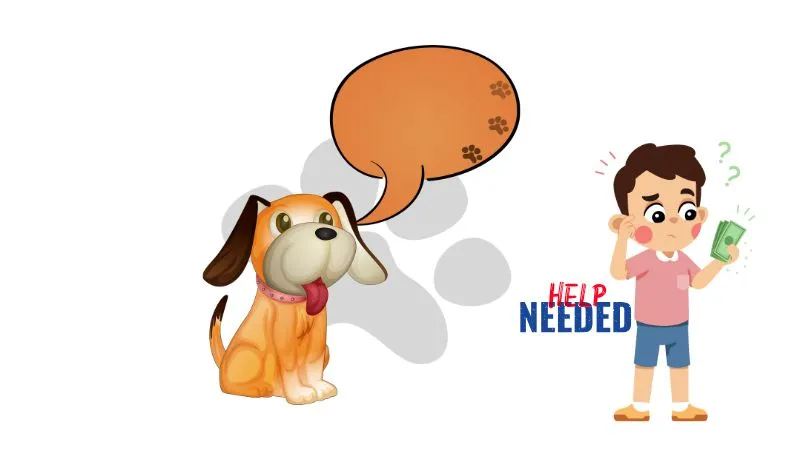German Shepherds are known for their loyalty, intelligence, and impressive work ethic. But if you’re a German Shepherd owner, you might have noticed another common trait: whining. Do German Shepherds whine a lot? Yes, they do tend to vocalize more than some other breeds.
But it’s important to understand why they whine and what might be going on behind these sounds. Whining in German Shepherds is often an attempt to communicate, but it can sometimes signal a deeper issue. Knowing the root cause can help you respond effectively and keep your dog happy and well-adjusted.
In this post, we’ll discuss 11 common reasons German Shepherds whine and provide insights into managing this behavior.
Separation Anxiety
One of the primary reasons German Shepherds whine is separation anxiety. German Shepherds are highly attached to their families and struggle when left alone. They may become distressed, whine, and even exhibit destructive behavior if left for long periods. If your dog tends to whine excessively every time you leave the house or even step out of the room, separation anxiety could be the culprit.
Solution: Gradual training and desensitization can help manage separation anxiety. Start by leaving for short periods and gradually increase the time so the dog becomes comfortable with your absence. For severe cases, consulting a dog behaviorist may be beneficial.
Attention Seeking
German Shepherds are highly social and thrive on attention. Sometimes, whining is simply their way of asking for your time and affection. If your German Shepherd is whining while looking directly at you or pawing for your attention, they’re likely just looking for some love.
Solution: Ensure your German Shepherd gets enough social interaction and exercise daily. Regularly engaging in play and training sessions can help meet their need for attention and reduce unnecessary whining.
Boredom
German Shepherds are intelligent, energetic dogs who need physical and mental stimulation. Boredom can lead to whining as they try to express their frustration. A lack of sufficient activity or tasks to focus on can make them restless and vocal.
Solution: Ensure your German Shepherd gets plenty of physical exercise, mental challenges, and interactive toys to keep them engaged. Activities like agility training, fetch, or teaching new commands can give them the psychological and physical stimulation they crave.
Physical Discomfort or Pain

Sometimes, whining can indicate physical discomfort or pain. German Shepherds are prone to specific health issues, such as hip dysplasia and arthritis, which can cause them to whine as a reaction to pain. If your dog is constantly whining and appears distressed, a medical issue could be at play.
Solution: If you suspect your dog’s whining is due to physical discomfort, consult a veterinarian. Regular check-ups can help catch potential health issues early and provide your dog with the treatment it needs.
Hunger or Thirst
Whining can also be a straightforward expression of basic needs. If it’s close to your German Shepherd’s mealtime, they might whine to remind you that they’re hungry or thirsty. This is particularly common if there have been changes in their feeding schedule.
Solution: Stick to a consistent feeding schedule and ensure they always have access to fresh water. This helps avoid confusion about mealtimes and reduces whining related to hunger or thirst.
Stress or Anxiety in New Situations
German Shepherds are sensitive and can experience stress in unfamiliar environments or situations. Changes in their routine, new people, or other household animals may trigger whining as a way to express unease. For example, a German Shepherd may whine excessively if moved to a new home or when introduced to new people.
Solution: Gradual exposure and positive reinforcement can help your German Shepherd feel more comfortable in new situations. Try to make these experiences positive by rewarding them with treats and encouragement when they remain calm.
Excitement
Whining in German Shepherds doesn’t always mean something negative. Often, it’s a sign of excitement. They might whine to show enthusiasm when they anticipate something enjoyable, like walking or playing. This is a common trait, as they are naturally expressive dogs.
Solution: While it’s normal for German Shepherds to whine when excited, training them to remain calm can help control the volume of their expressions. Reward them when they stay quiet in exciting situations, like before a walk or play session.
Submission or Appeasement
German Shepherds may whine to show submission, particularly when interacting with other dogs or meeting new people. This behavior is often seen in puppies or young German Shepherds as they try to convey that they are non-threatening. Whining as a form of appeasement is a natural canine behavior and usually isn’t a cause for concern.
Solution: Avoid punishing submissive whining, as it’s your dog’s communication method. Instead, give them time to adjust and reward confident behavior to help boost their social skills.
Communicating Needs

German Shepherds, known for their intelligence, often whine to communicate specific needs. Whether it’s signaling they need to go outside, that they’re uncomfortable, or even that they’re bored, whining can be their way of getting your attention to meet a particular need.
Solution: Pay attention to patterns in your dog’s whining and body language to better understand their message. Training them to signal specific needs, like going outside, using a doorbell, or a particular cue, can reduce whining.
Protective Instincts

German Shepherds are natural protectors and may whine to alert you to potential threats or unusual sounds. Their instincts can alert them to sounds and changes in their environment. In this case, whining is often a precursor to barking and serves as an alert.
Solution: To reduce excessive protective whining, reinforce quiet behavior when they start to whine. Training them to respond to commands like “quiet” or “enough” can help prevent constant whining in response to sounds or sights.
Past Trauma or Rescue Background
For German Shepherds that have been adopted from shelters, past trauma or negative experiences can lead to increased whining. Dogs with a rough past might whine out of fear or insecurity, especially in response to loud noises or when left alone. Whining, in this case, may be a profoundly ingrained reaction to past trauma.
Solution: Patience and consistent positive reinforcement are essential when dealing with a rescue dog. Working with a professional dog trainer with experience in behavior modification can also help build their confidence and reduce anxiety-related whining.
Managing and Reducing Whining in German Shepherds
Understanding the root causes of whining in German Shepherds can go a long way toward managing the behavior. Here are a few general tips to help keep your German Shepherd calm and minimize whining:
Routine:
Establish a consistent routine to reduce anxiety related to uncertainty.
Exercise:
Ensure your German Shepherd gets adequate physical and mental exercise each day.
Positive Reinforcement:
Reward calm behavior and ignore unnecessary whining to reinforce the idea that quiet is rewarded.
Training Cues:
Use “quiet” or “enough” training cues to teach your dog when to stop whining.
Patience:
Remember that whining is a form of communication, and your German Shepherd is not whining to bother you but to express themselves.
German Shepherds may be more prone to whining than other breeds, but this doesn’t have to be a negative trait. Paying attention to the causes and proactively addressing their needs can help your dog feel secure and minimize excessive whining.
Whether it’s separation anxiety, excitement, or a simple request for attention, understanding why German Shepherds whine a lot enables you to respond in ways that benefit you and your furry companion.
Final Thoughts
Do German Shepherds whine a lot? Yes, but that’s because they are highly expressive, intelligent, and communicative dogs. Whining is one way German Shepherds try to connect with us, communicate their needs, and express their emotions.
You understood the reasons behind your dog’s whining, whether attention-seeking, physical discomfort, or excitement, and that they can help you respond effectively, making you and your dog feel more connected and understood.
Patience, observation, and consistency are essential when dealing with any vocalization. By identifying and addressing the reasons behind your German Shepherd’s whining, you’ll help curb this behavior and strengthen the trust and bond between you.
Remember, they’re not whining to be a nuisance; they’re just trying to tell you something in the only way they know how. With the right approach, you can help them feel secure, supported, and understood, creating a more harmonious home environment for both of you.
FAQs
Why does a German Shepherd whine?
A German Shepherd may whine for several reasons, including seeking attention, expressing discomfort, or communicating anxiety. Whining can also indicate a need, like hunger or a desire to go outside. Understanding the context and body language accompanying the whining is crucial to determining its cause.
Are German Shepherds very vocal?
Yes, German Shepherds are known to be vocal breeds, often barking, whining, and howling to communicate. This vocal nature is part of their herding instincts and intelligence, allowing them to convey various needs and emotions. Training and socialization can help manage excessive vocalizations.
Do German Shepherds make a lot of noise?
German Shepherds can be noisy, mainly if they need more mental stimulation or exercise. Their intelligence and protective nature may lead them to vocalize frequently, reacting to different stimuli or alerting their owners to perceived threats. Adequate training can help in managing these tendencies effectively.
Why are German Shepherds so clingy?
German Shepherds are inherently loyal and tend to form strong bonds with their family members, often resulting in clingy behavior. This attachment is due to their breed history as working and herding dogs, naturally making them protective and attentive. Providing them with ample attention and activities can help reduce overly clingy behavior.

